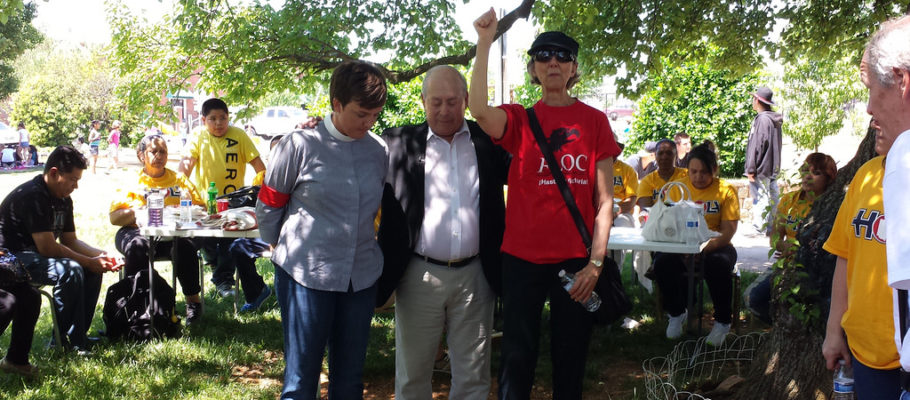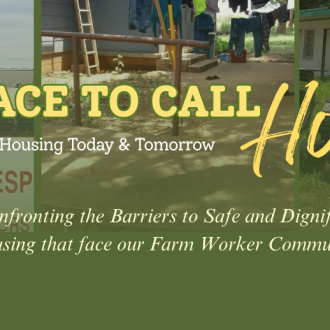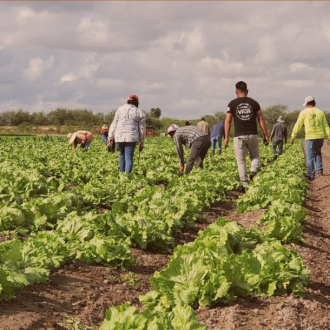
On Tuesday, November 11, 2014, twelve representatives from the Religious Leaders for Tobacco Farm Worker Justice coalition met with John “Tripp” Wilson and Ronald Wright from Reynolds American Tobacco at Umstead Park United Church of Christ in Raleigh, North Carolina. This meeting was occasioned by a July 2014 letter from religious leaders to Reynolds executives calling for 1) Reynolds American to negotiate a memorandum of understanding – as requested by the Farm Labor Organizing Committee (FLOC) – that will guarantee freedom of association, without retaliation, to farm workers employed on Reynolds American’s contract farms and 2) to prohibit growers from retaliating against farm workers for exercising basic workplace rights.
The July 2014 letter, with nearly 500 signatories, was sent to the entire Reynolds American Tobacco Board of Directors. Approximately three months later, with no response from Reynolds, religious leaders followed up with phone calls. Rev. Andreolli-Comstock, Executive Director of National Farm Worker Ministry contacted Reynolds CEO Susan Cameron. Reynolds Vice President for Corporate Sustainability and Commercial Equity John “Tripp” Wilson returned Andreolli-Comstock’s call and together set the meeting.
“Alarm from the faith community about farm worker conditions across the country is clearly on the rise. The 2014 letter produced nearly 200 more signatories than the 2012 letter – in an even shorter window of time. Religious leaders are fed up with injustice in America’s tobacco fields and are ready to see powerful executives respond to their concerns,” said Rev. Andreolli-Comstock. Rev. Doug Long, Pastor of Umstead Park United Church of Christ, Susan Alan, Associate Director of National Farm Worker Ministry, Dave Austin, member of Eno River Unitarian Universalist Fellowship, Miriam Thompson, member of Yavheh Synagogue, Taylor Pfaff, student at Duke Divinity School, Rev. Nancy Petty, Pastor of Pullen Memorial Baptist Church, Ramon Zepeda, a Program Director with Student Action with Farmworkers, Sandy Irving, a volunteer with the North Carolina Council of Churches, Rita Kuwahara, member of Durham Friends Meeting and Naveed Moeed from Chapel Hill Friends Meeting were all in attendance.
A number of issues were discussed between the religious leaders, Wilson and Wright. Of significant concern were questions centering on a lack of transparency on the part of Reynolds.
Reynolds claims that their audit of Reynolds-contract growers’ farms has uncovered little evidence of problems with living or working conditions in North Carolina fields. Of the few issues that did emerge from their audit, Reynolds claims they can be or have been corrected. They espouse their audit as proof of their good reputation in the tobacco industry whenever a grievance or concern from the fields is voiced. Yet in other contexts, Reynolds claims that because almost all growers contract with multiple processors, Reynolds should not be expected to provide incentives to collectives of Reynolds contracted growers to mitigate worker freedom of association issues because those growers are not technically Reynolds’ in the sense that they are contracted with by multiple processors.
How can Reynolds claim that an audit was done of “their” farms when they also claim that they have no farms in the sense that they are but one of many processors?
Another issue of significance during the meeting was Reynolds refusal to participate in a labor dispute arbitration mechanism that would provide farm workers who join a union a dispute settlement mechanism similar to other workers actually covered under US law. This feasible next step, known as the Dunlop Commission, was recently proposed by Farm Labor Organizing Committee (FLOC) President Baldemar Velasquez in response to the ineffectiveness of the Farm Labor Practices Group (FLPG) instituted a few years ago.
Wilson and Wright concluded talks on Tuesday with the contention that providing economic incentives to their growers to adhere to a process that would allow for freedom of association for farm workers was simply too costly. As people of faith, we contend that the high cost of human dignity for the men, women and children working America’s tobacco fields across the Southeast are also too high a price to pay. “America was not built on the least common denominator. Instead we developed principles that said we care for all humanity; we care for one another,” said Rev. Nancy Petty, Pastor of Pullen Memorial Baptist Church. “The law is often the lowest common denominator. The companies that are inspiring us now are the ones that do justice, love kindness, and walk humbly with God.”
Despite Wilson and Wright’s concerns that Reynolds American Tobacco is being singled out and discriminated against, the coalition of religious leaders walked away pleased with Tuesday’s meeting. The marginalized men, women and children who harvest Reynolds’ tobacco continue to organize and exercise their collective voice. Reynolds American has the power to change embarrassing conditions as laid out in OxFam America’s “State of Fear” report, for thousands of workers in North Carolina and beyond. An agreement between FLOC and Reynolds American would be an opportunity for Reynolds, a multi-million dollar corporation, to set the industry standard for tobacco farm worker conditions.
Communication between faith leaders and Reynolds continues. Another meeting is planned for the near future.
For more information on the Reynolds Tobacco Campaign and issues faced by farm workers, please visit www.nfwm.org or www.floc.com.



